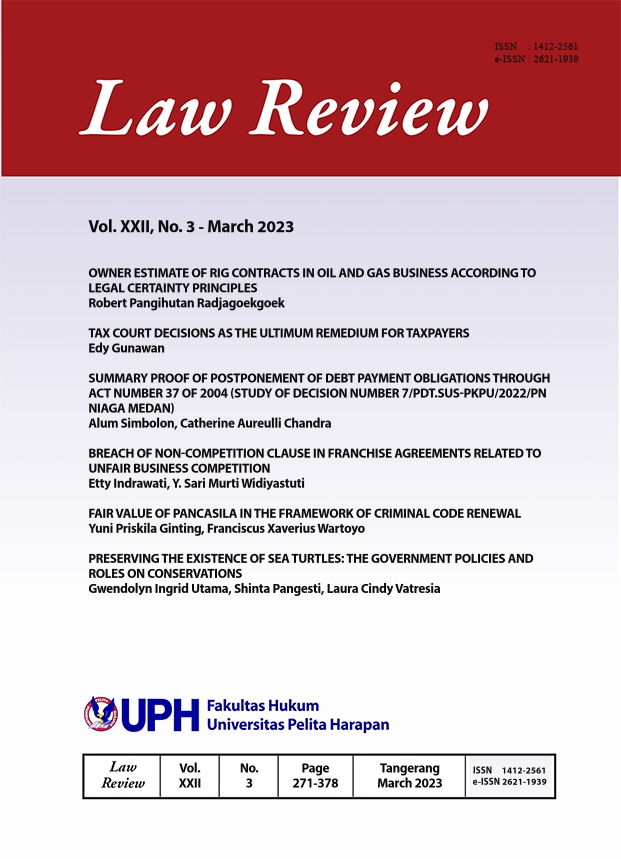Summary Proof of Postponement of Debt Payment Obligations Through Act Number 37 of 2004 (Study of Decision Number 7/PDT.SUS-PKPU/2022/PN NIAGA MEDAN)
DOI:
https://doi.org/10.19166/lr.v22i3.6908Kata Kunci:
Debt, Summary Proof, PostponementAbstrak
Debt is a liability that arises through an agreement made between a debtor and a creditor. Debt is used as a basis for bankruptcy or for submitting a delay in payment of the debtor's debt. Summary Proof of Bankruptcy and Postponement of Debt Payment Obligations (PKPU) has actually been regulated in Article 8 paragraph (4) of Law Number 37 of 2004 and strengthened by Supreme Court Decision (MA) No.109/KMA/SK/IV/2020 concerning "Enforcement of the Handbook for Settlement of Bankruptcy Cases and PKPU". Summary Proof can be a reference for the Panel of Judges in granting PKPU applications by debtors or creditors to the Commercial Court. The PKPU application submitted through Decision Number 7/Pdt.Sus-PKPU/2022/PN Niaga was rejected by the Panel of Judges because the Panel of Judges considered that the non-fulfillment of the 'simple debt' requirement that had to be fulfilled was one of the burdens of proof in the application for PKPU.
Referensi
Books
Hartini, Rahayu. Hukum Kepailitan. Malang: Universitas Muhammadiyah, 2017.
Ivida, Demi Amrih. Hukum Kepailitan Kepastian Karakteristik Renvoi Prosedur Dalam Perkara Kepailitan. Yogyakarta: Laksbang Justitia, 2020.
Muhammad, Abdulkadir. Hukum Perusahaan Indonesia. Yogyakarta: Indografika, 2017
Mulyadi, Kartini. Pedoman Menangani Kepailitan. Depok: Rajawali, 2005.
Munawir, Analisa Laporan Keuangan. Yogyakarta: Liberty, 2004.
Remy S, Sutan. Hukum Kepailitan Memahami Undang-Undang No. 37 Tahun 2004 Tentang Kepailitan. Jakarta: Grafiti, 2010.
Sjahdeini, Sutan. Sejarah, Asas, dan Teori Hukum Kepailitan. Surabaya: Kencana, 2016.
Suci, Ivida & Poesoko, H. Hukum Kepailitan. Yogyakarta : Laksbang Pressindo, 2014.
Journal Articles
Aprita, Serlika. "Meluruskan Logika Pemerintah Soal Kegentingan Moratorium UU Kepailitan dan PKPU." 'ADALAH 6, no. 6 (2022): 11-27, https://doi.org/10.15408/adalah.v6i6.27582.
Bhagawanthi Pemayun, Cok Istri, and I Ketut Westra. "Kewenangan Kurator Dalam Pemberesan Aset Debitor Pailit yang Berupa Saham Pada Perseroan Terbatas." Kertha Semaya: Journal Ilmu Hukum 8, no. 8 (2020): 1180-90, https://doi.org/10.24843/KS.2020.v08.i08.p06.
Harsono, Ivan, and Paramita Prananingtyas. "Analisis Terhadap Perdamaian Dalam PKPU dan Pembatalan Perdamaian Pada Kasus Kepailitan PT Njonja Meneer." Notarius 12, no. 2 (2019): 1067-88, https://doi.org/10.14710/nts.v12i2.29154
Juliantini, Ni Nyoman, et.al."Prosedur Dan Akibat Hukum Penundaan Kewajiban Pembayaran Utang Perseroan Terbatas (Studi Kasus Putusan Nomor 3/PKPU/2010/PN.Niaga.Sby)." Jurnal Analogi Hukum 3, no.1 (2021): 101-5, https://doi.org/10.22225/ah.3.1.2021.101-105
Kertha, Wicara. “Pembuktian Sederhana dalam Perkara Kepailitan oleh Agen Sindikasi Kredit sebagai Pemohon Pailit.” Jurnal Ilmu Hukum 7, no.3 (2018): 1-17.
Kheriah. "Independensi Pengurus Penundaan Kewajiban Pembayaran Utang (PKPU) dalam Hukum Kepailitan." Jurnal Ilmu Hukum Riau 3, no. 2 (2013): 238-57.
Simaremare, Sumurung P., et.al. "Politik Hukum Jangka Waktu Penundaan Kewajiban Pembayaran Utang di Indonesia." Jurnal Ius Constituendum 6, no. 1 (2021): 99-118, http://dx.doi.org/10.26623/jic.v6i1.2915
Unduhan
Diterbitkan
Cara Mengutip
Terbitan
Bagian
Lisensi
Authors who publish with this journal agree to the following terms:
1) Authors retain copyright and grant the journal right of first publication with the work simultaneously licensed under a Creative Commons Attribution License (CC-BY-SA 4.0) that allows others to share the work with an acknowledgement of the work's authorship and initial publication in this journal.
2) Authors are able to enter into separate, additional contractual arrangements for the non-exclusive distribution of the journal's published version of the work (e.g., post it to an institutional repository or publish it in a book), with an acknowledgement of its initial publication in this journal.
3) Authors are permitted and encouraged to post their work online (e.g., in institutional repositories or on their website). The final published PDF should be used and bibliographic details that credit the publication in this journal should be included.





